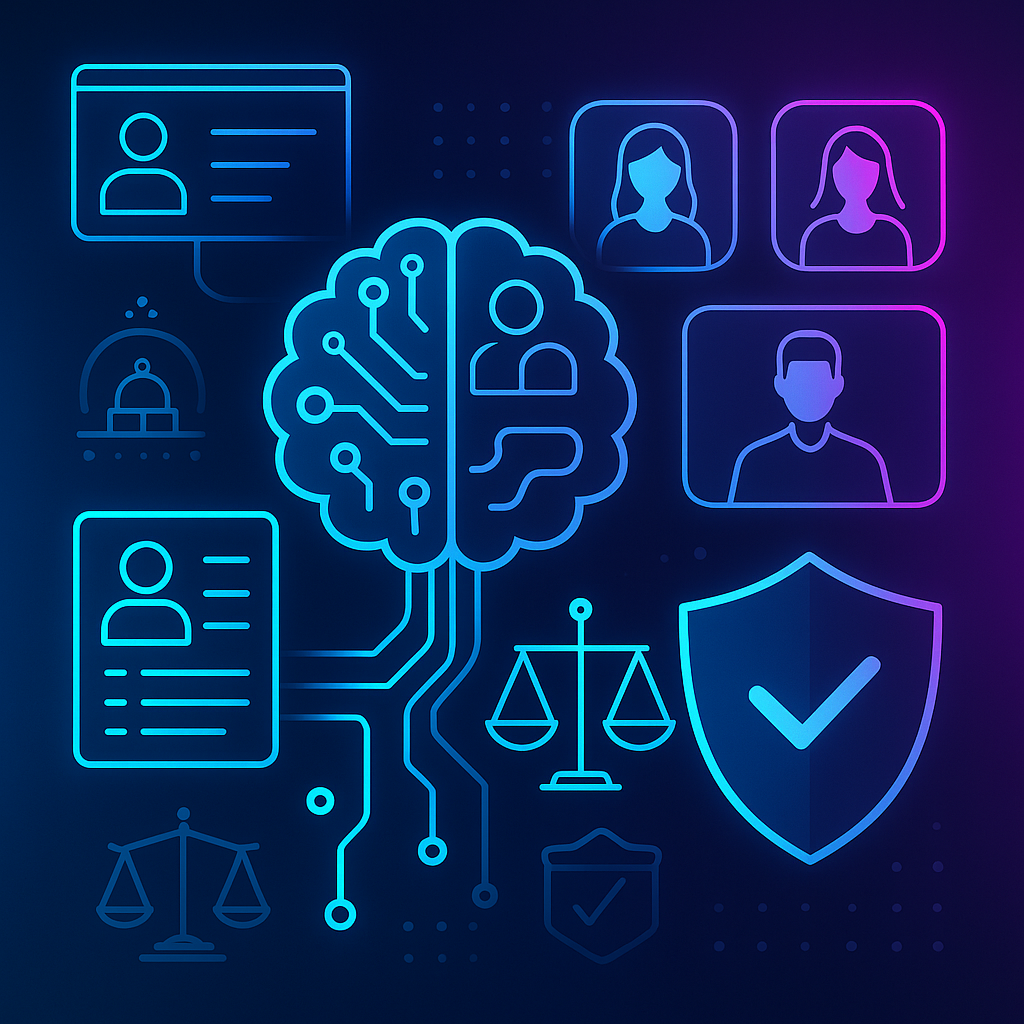How to Ensure Diversity Hiring Doesn’t Violate Employment Laws

In 2021, President Joe Biden signed Executive Order 14035 to promote Diversity, Equity, and Inclusivity (DEI) in the United States workforce.[1] He wanted the typical workplace to be an environment “where all employees are treated with dignity and respect.”
But diversity in the workplace goes far beyond that.
Diversity hiring means not just selecting a new recruit based on merit, but also ensuring that the recruitment process reduces biases associated with the candidates’ race, gender, age, religion, gender identity, and sexual orientation. At the same time, companies cannot consider diversity hires just for the sake of diversity. After all, they have a business to run and grow. Also, hiring candidates just to ensure representation of different demographics in the workforce might lead to “reverse discrimination.” Therefore, while hiring for diversity, HR teams must maintain a balance between compliance with employment laws and hiring the best-fit candidate.
In this blog, we are going to cover what, why and how of diversity hiring within US employment laws. But before we do, let’s understand why diversity hires are a necessity for the workplace in the first place.
Benefits of a diverse workforce
Diversity hiring aims to identify and minimize potential biases while sourcing, screening, shortlisting, and recruiting qualified, diverse job seekers. But workforce diversity isn’t just about compliance. It offers multiple benefits that could spur success and growth for a business, allowing it to establish a robust global footprint. For instance, a McKinsey report revealed that companies that are more inclusive and diverse outperform their peers by 35%[2].
Here’s a look at some of the key benefits of diversity hires.
Enhanced problem-solving and creativity
When teams comprise people from diverse backgrounds, the pool of skills, insights, and perspectives widens. This leads to better strategic thinking and creativity, which means improved innovation – the foundation of business success. When employees draw from and share their unique experiences and knowledge base, it could also enhance collaboration.
Smarter strategic decisions
Research shows that diverse teams tend to make better decisions up to 87% more than non-diverse teams[3]. Teams with diversity hires are also likely to be more socially aware. They are known to process information more carefully, which is a key factor in data-driven decision-making.
Higher employee retention
Did you know that 76% of job seekers prioritize diversity while evaluating job offers and companies[4]? This means that when you focus on diversity hiring, you immediately enhance your talent pool. Employees will feel more comfortable in an inclusive environment, which enhances their job satisfaction.
Improved productivity and profitability
Companies that ensure workplace diversity are found to witness 2.5x cash flow per employee than non-diverse companies[5]. Plus, as mentioned earlier, such companies have better engaged and satisfied employees. This directly translates into higher productivity. Enhanced productivity, in turn, leads to improved profitability and growth.
Better brand reputation
Businesses that engage in diversity hiring tend to be perceived as socially responsible. This leads to an improved employer brand image, which helps attract new customers. Workplace diversity also has a positive impact on company culture, which not only enhances the talent pool a business can draw from but also boosts brand reputation.
Diversity hiring vs. employment equity: Understand the difference
While ensuring workplace diversity is about recognizing, respecting, and valuing differences among employees, equity means giving equal opportunities for success to each employee. So, diversity hiring and employment equity have some things in common, such as:
- Hiring, rewarding, and promoting employees only based on merit
- Creating a fair, inclusive, and barrier-free workplace
- Treating all employees with dignity and respect
- Ensuring that the composition of the workforce is a microcosm of the community
The difference arises in terms of HR policies. Diversity hiring means choosing recruits in a way that does not discriminate between candidates based on:
- Race
- Ethnicity
- Age
- Gender
- Gender identity
- Sexual orientation
- Socioeconomic background
- Disability
Equity, in terms of HR policies, is more about creating processes and programs that are fair and impartial and ensure equal potential outcomes for every employee. This could even mean differences in processes for different teams so that everyone can access opportunities for success. This brings us to the importance of employment laws that cover diversity hiring.
Major US laws governing diversity hiring
Equal Pay Act of 1963
Part of the Fair Labor Standards Act of 1938 and enforced by the Equal Employment Opportunity Commission (EEOC), the Equal Pay Act (EPA)[6] was the first anti-discrimination legislation in the US. The EPA offers protection against gender-based wage discrimination. It covers all forms of wage dispensation, such as salary, bonuses, overtime pay, profit sharing, stock options, etc.
Title VII of the Civil Rights Act of 1964
Also enforced by the EEOC[7], this law goes beyond the EPA, making it illegal to discriminate against job applicants and employees based on race, religion, color, gender, national origin, age, or disability. Title VII has been recently expanded to include the protection of transgender individuals and putting an end to forced arbitration for claims related to sexual harassment and sexual assault.
Americans with Disabilities Act of 1990
The ADA prohibits discrimination based on various forms of disability. Title I of the ADA[8] specifically deals with the rights of job seekers and employees in the private and public sectors. The act was amended in 2008 to expand the definition of disability to include individuals with a physical and mental impairment that significantly limits major activities of daily living.
The Dos and Don’ts of legal diversity hiring
Given that employment law makes discrimination unlawful, organizations need to ensure that HR managers and recruiters are trained in what to consider while making hiring decisions. They should also be trained in what questions can and cannot be asked during the hiring process.
Here are some major considerations to keep in mind for diversity hires.
The Dos
-
- Be strategic about placing job postings. Consider partnering with a provider of recruitment-as-a-service known for their vast database of job seekers. Social media and a diversified network can be great ways to reach out in a non-discriminatory manner.
- Look for ways to attract diverse job seekers. You could run a PR campaign that highlights the company culture. You could also bring in changes, such as flexibility and good work-life balance, to attract working mothers.
- Include your commitment to DEI in your job postings. A statement regarding your non-discriminatory HR policies can do the trick.
Suggested Reading on DEI Hiring: Blueprint to drive DEI hiring in the workplace
The Don’ts
-
- Don’t include discriminatory language in your job postings and advertisements. For instance, don’t say “seeking a female technician” or “energetic, youthful developer.” in your job description.
- Don’t seek referrals based on specific attributes that could be part of anti-discrimination law. For example, don’t ask for “any (name of ethnicity) people” for a job opening.
- Do not seek the disclosure of protected information during the application process. This means not asking for a photograph that reveals the candidate’s age, gender, race, etc.
Questions to ask yourself to build a diversity hiring strategy
To build a well-thought-through diversity hiring strategy, you first need to answer some key questions:
How do you enhance diversity within the organization?
You will find opportunities to improve workplace diversity through various stages of the hiring process. Work on your talent management strategy by harnessing the power of big data and Artificial Intelligence (AI) for multi-channel sourcing. A holistic, multidimensional approach will open up a large and rich talent pool.
Should diversity be preferred over ability?
When you have access to a massive database of candidates, you need never compromise on either ability or diversity. People from diverse backgrounds and cultures will bring varied knowledge, skills, and perspectives to the table.
Where should you begin with diversity hiring?
Bringing diversity to the workforce has to be a combined internal and external effort. Start by looking for tools that can help you minimize unconscious bias while customizing candidate sourcing to meet your DEI goals.
How do you avoid “reverse discrimination”?
Reverse discrimination occurs when an employee is hired or promoted due to protected attributes (as per the laws mentioned above), all other things being equal. Merit should be the differentiator in such decisions.
Final Words
As much as it’s crucial to ensure compliant diversity hires, it’s an equally complex process as well. There are lots of moving parts. That’s why many HR teams are leaning towards platforms that use Artificial Intelligence while matching people to jobs. Such a platform uses hundreds of attributes to find the best-fit job seekers. Easily integrated with your existing ATS or CRM, Leoforce Quantum is one such AI hiring platform. It is highly customizable, allowing you to fine-tune parameters to your DEI goals without any additional costs. Request a Demo today to streamline workforce diversity in compliance with employment laws.
FAQs
What is a diversity hire?
A diversity hire refers to the practice of hiring individuals from underrepresented groups to promote diversity in the workforce.
Diversity hiring vs DEI hiring?
Diversity hiring focuses on increasing representation, while DEI (Diversity, Equity, and Inclusion) hiring emphasizes creating an inclusive and equitable work environment.
Are there employment laws for diversity hiring?
Employment laws prohibit discrimination based on protected characteristics, but they generally do not specifically address diversity hiring.
Is it illegal to hire for diversity?
It is not illegal to hire for diversity, as long as it is done in compliance with existing employment laws.
What is reverse discrimination?
Reverse discrimination refers to the alleged unfair treatment of individuals from majority groups in favor of minority groups, based on the notion of promoting diversity.
Resources
[1] https://www.whitehouse.gov/briefing-room/presidentialactions/2021/06/25/executive-order-on-diversity-equity-inclusion-and-accessibility-in-the-federal-workforce/
[2] https://www.mckinsey.com/business-functions/organization/our-insights/why-diversity-matters
[3] https://www.cloverpop.com/hacking-diversity-with-inclusive-decision-making-white-paper
[4] https://www.glassdoor.com/employers/blog/diversity/
[5] https://www.researchandmarkets.com/reports/5519706/diversity-and-inclusion-dandi-global-market
[6] https://www.eeoc.gov/statutes/equal-pay-act-1963
[7] https://www.ftc.gov/policy-notices/no-fear-act/protections-against-discrimination
[8] https://www.dol.gov/general/topic/disability/ada





